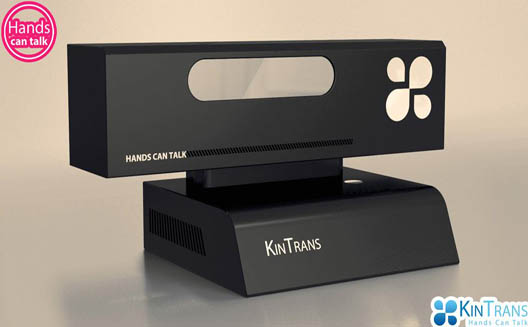What KinTrans' Mohammed Elwazer learned at SeedStars International

KinTrans may not have won SeedStars 2015 competition in Geneva in February, but founder Mohammed Elwazer didn’t walk away empty handed.
While the top prize of $500,000 went to Philippine startup Salarium - a payroll service - Elwazer and KinTrans came back with invaluable advice, feedback and training.
Seedstars World focuses exclusively on emerging markets, where access to capital, investors, advisors and talent have yet to catch up.

KinTrans translates sign language into audible words and text. The inspiration for the application came years earlier, when Elwazer was in the metro station of his native Cairo and witnessed a deaf young man in the midst of a misunderstanding with a police officer.
With very little access for the deaf in Egypt and across the region, Elwazer realized the immense need for a tool to help the hearing impaired communicate, one that would make sense for the MENA region - something that requires little training and is convenient. Over time, this inspiration became KinTrans.
Elwazer is a computer systems engineer, and designed KinTrans to work with Microsoft Kinect software as featured in the Xbox 360, to translate an individual signing into voice and text. KinTrans and Elwazer are based in Dubai, after cycling through the Turn8 accelerator there, with some engineers based in Cairo.
Seedstars World event gave Elwazer the opportunity to meet, brainstorm and learn from entrepreneurs facing challenges exceedingly similar to his own. Frustrations with visas, registration costs and bureaucratic hangups permeate emerging markets. By presenting his company several times, first for the semi-finals in Dubai, and again during the competition in Geneva, Elwazer picked up feedback and advice on his pitch at every step of the way.
The opportunities for networking was perhaps the most important part for these startups, where mentors and advisors are far less abundant than in tech capitals like Silicon Valley, Berlin or London. While Elwazer contends that Seedstars is on the whole less interested in startups with a social mission, such as his, it was still invaluable for his company.
When I spoke to Elwazer, we discussed the potential for KinTrans and the larger startup community in the region. Looking to the future of KinTrans specifically, Elwazer is excited for the potential in 2015. With new laws in the UAE mandating access for the disabled, he has already completed a trial program at the airport, and is looking forward to pilot programs to be implemented this year in conjunction with a number of governmental sectors in the UAE.
For KinTrans, expanding partnerships with government organizations will be the key. Countries that mandate accessibility standards are his main target. Elwazer hopes to sell the KinTrans system to public and private institutions that need better solutions to meet their standards. The US, UK, China and Saudi Arabia are all on his list as countries with accessibility requirements that could use KinTrans.
The use of KinTrans may lead to more seamless interactions with hearing impaired individuals if they’re able to dispense with translators and lengthy written responses.
Elwazer admits there is a long way to go for governments in the region to encourage a startup community. Government regulations and the time commitment required by startups can be prohibitive in many cases. Without the support of accelerators and VC firms focused on the region, starting a small company can be nearly impossible for many founders.
Elwazer’s advice to new startups? Keep moving forward, keep expanding your network and always take the time to sit down with smart people. The more you can learn from experienced leaders, the better.


